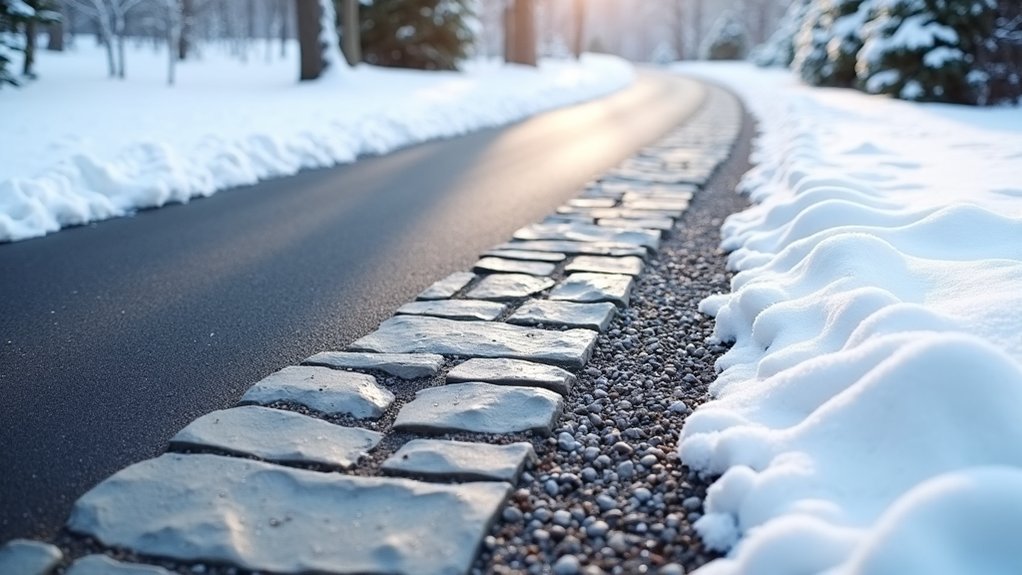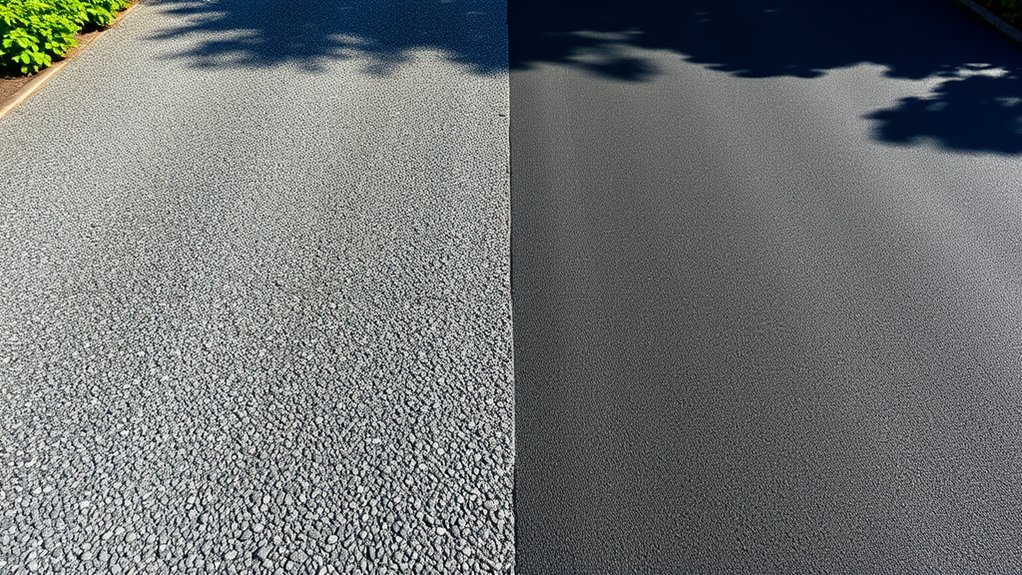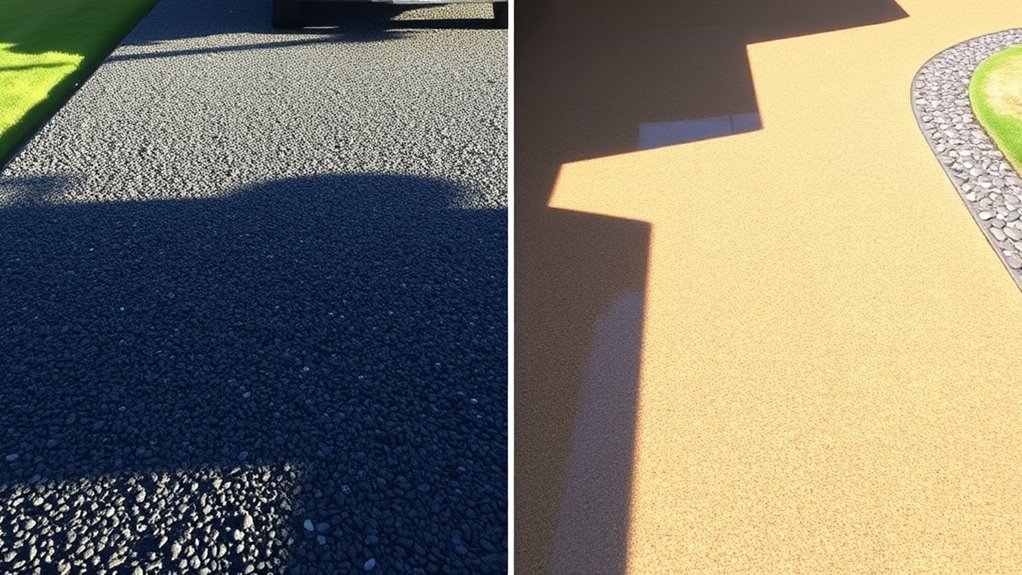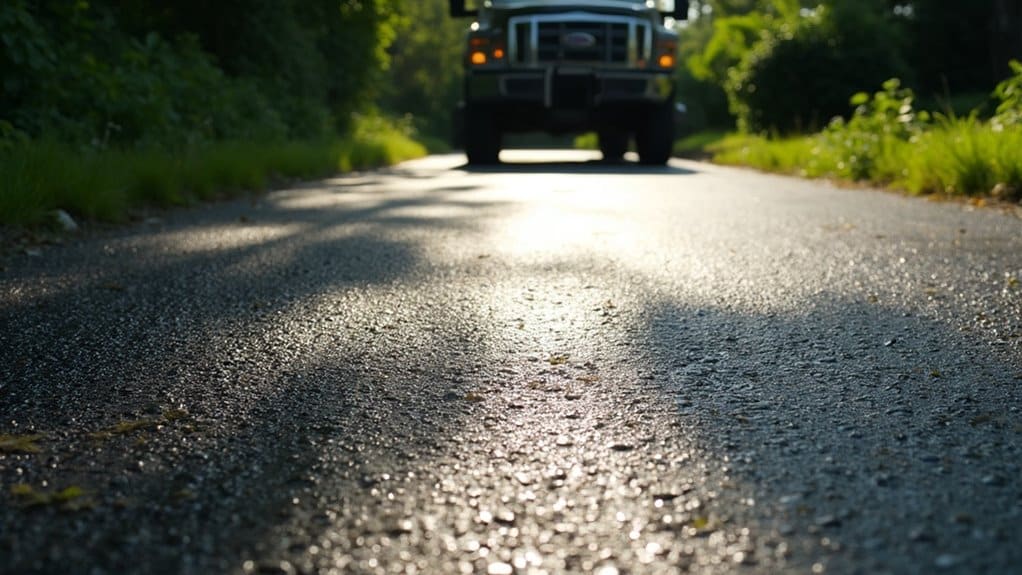In cold climates, asphalt driveways are a reliable option because they are flexible and can handle freeze-thaw cycles, which helps prevent cracking. Concrete driveways are very durable and can last for decades if maintained properly. Paver driveways are great for drainage and managing ice. Gravel is a cost-effective choice that allows for natural water drainage, reducing the risk of ice. Lastly, resin-bound driveways are a modern alternative. Each material has its own advantages, so consider your specific needs to ensure the best performance during harsh winters.
Table of Contents
ToggleKey Takeaways
Which Driveway Material Works Best in Cold Climates?
- Asphalt driveways are flexible and can withstand freeze-thaw cycles, reducing the risk of cracking. Their dark colour also helps with melting snow and ice.
- Concrete driveways are robust and can endure harsh weather, potentially lasting up to 50 years with the right care and installation.
- Paver driveways consist of interlocking stones that effectively manage stormwater runoff and resist damage from freeze-thaw cycles, which can extend their lifespan.
- Gravel driveways are cost-effective initially and provide natural drainage. However, they require regular upkeep to maintain a level surface.
- Regardless of the material, proper installation and maintenance are crucial for ensuring long-lasting performance in cold weather conditions.
Asphalt Driveways: Flexibility and Cost-Effectiveness in Cold Weather
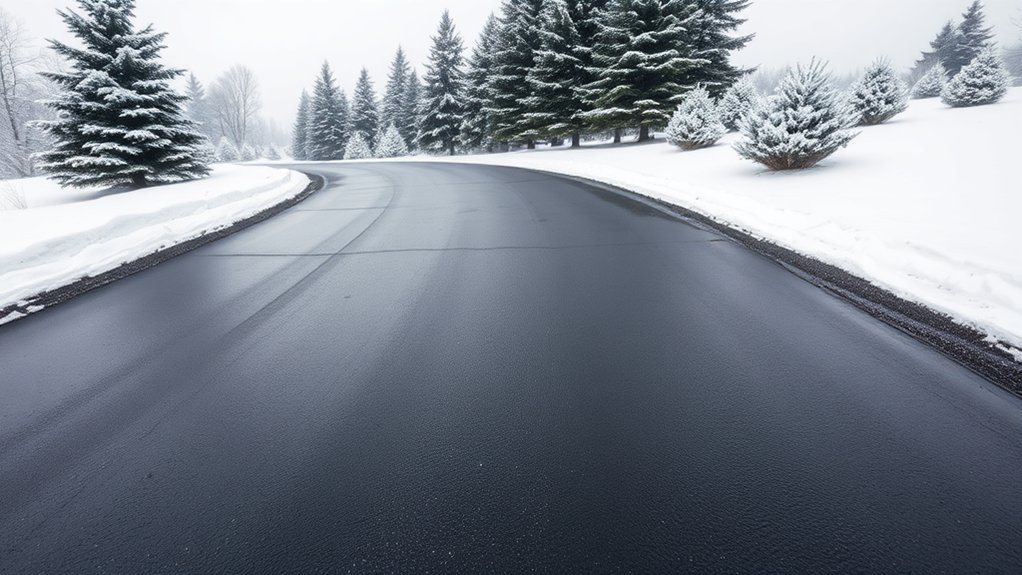
When choosing driveway materials for colder climates, asphalt is an excellent option due to its flexibility and affordability. Its ability to expand and contract with freeze-thaw cycles helps prevent cracking, which extends its lifespan. Unlike concrete, asphalt doesn’t need expansion joints, making it a sensible choice for areas with varying temperatures. Its dark colour absorbs sunlight, helping to melt snow and ice more quickly, thus enhancing its performance in winter. Additionally, asphalt has good thermal conductivity, which ensures even heating and reduces the likelihood of ice patches forming. The slightly porous surface of asphalt also aids in effective drainage, minimising standing water and the risk of hazardous ice. Furthermore, asphalt’s heat retention from sunlight absorption is crucial for snow melting during winter conditions. Regular inspections and prompt repairs are essential to protect the driveway integrity and enhance performance in winter weather.
Concrete Driveways: Durability and Long-Term Value
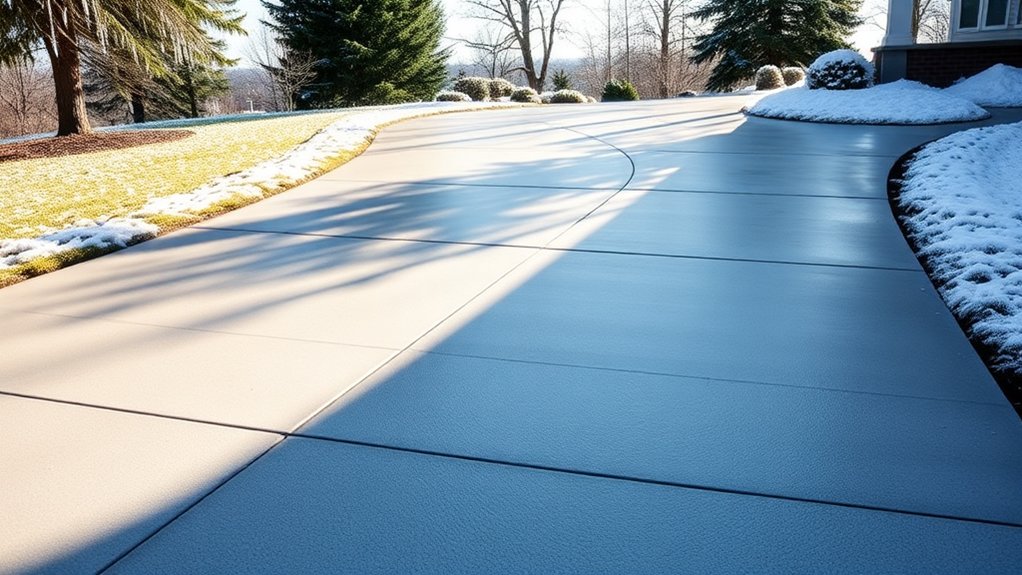
Concrete driveways are known for their durability, often lasting between 25 to 30 years, and in some cases, even over 50 years with proper care. Their resistance to freeze-thaw cycles makes them a solid choice for colder regions, as they withstand harsh weather better than many alternatives. With regular upkeep, concrete driveways maintain their strength and prove to be a cost-effective option, helping to avoid the frequent repairs or replacements that other materials might require. Proper preparation is essential to avoid winter freeze-thaw damage, ensuring that your concrete driveway lasts through the toughest of seasons. Additionally, regular inspections can help identify potential issues early, further extending the lifespan of the driveway.
Long Lifespan Benefits
Investing in a concrete driveway can provide substantial long-term benefits, especially in colder climates where durability is essential.
With a lifespan of 25 to 30 years, and potentially up to 50 years with proper maintenance, concrete is more durable than many other materials. Although the initial cost may be higher, its ability to withstand heavier traffic and lower maintenance requirements make it a financially savvy choice over time. Furthermore, a well-installed concrete driveway retains its visual appeal, which can enhance your property’s value. Additionally, high-quality installations can exceed 25 years, further solidifying concrete’s reputation as a long-lasting material.
Freeze/Thaw Resistance
The durability of concrete driveways in cold climates hinges on their freeze/thaw resistance. Here are key factors to consider:
- Air Entrainment: Adding air voids is crucial to reduce hydraulic pressure during freezing.
- Air Void Parameters: Target a total air content of 6 ± 1% with a spacing factor of ≤ 0.20 mm for optimal results.
- Admixtures: Incorporate air-entraining admixtures like Vinsol resin to boost freeze-thaw resistance.
- Degree of Saturation: Ensure that the water in capillary pores doesn’t exceed 91.7% to avoid damage when temperatures drop.
Cost-Effective Maintenance
When choosing a driveway material for cold climates, cost-effective maintenance is crucial for your investment.
Concrete driveways offer significant savings due to their durability and low maintenance requirements. Although the initial cost ranges from £30 to £120 per square metre, their lifespan can extend up to 30 years, which helps keep long-term expenses down.
Unlike asphalt, which needs resealing every three to four years, concrete requires much less frequent upkeep, making maintenance easier. While repairs can be pricier, regular inspections and proper weatherproofing can prevent severe damage. Additionally, concrete’s long lifespan contributes to fewer repairs and lower maintenance costs over time.
Paver Driveways: Performance and Drainage Benefits
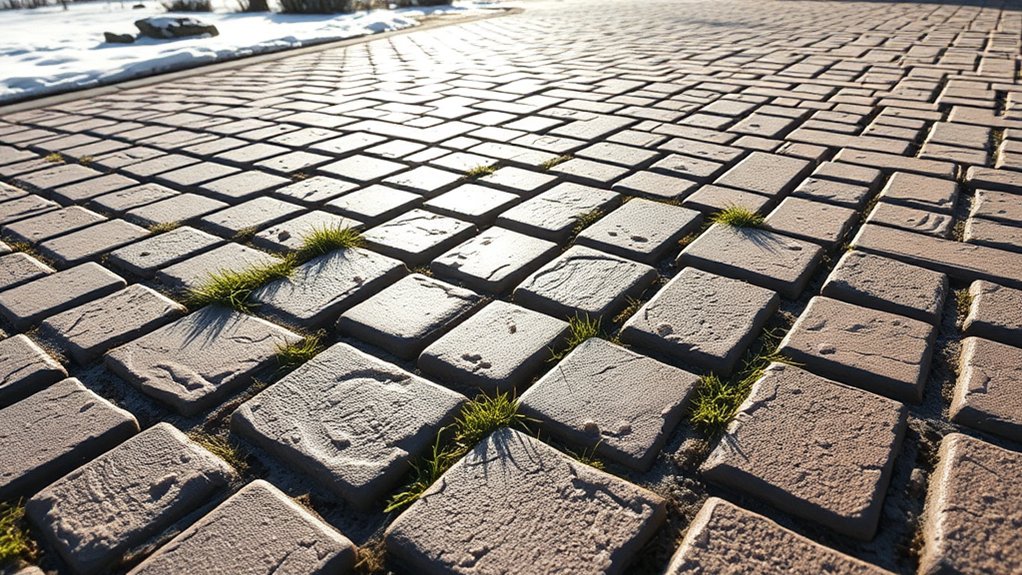
Selecting the right paving material for driveways in cold climates is crucial for performance and drainage.
Paver materials offer significant advantages, including:
- Durability: Concrete pavers can endure temperatures ranging from -30°C to 50°C, while brick pavers are suitable for -20°C to 40°C.
- Drainage Efficiency: Interlocking pavers with open joints help manage stormwater runoff effectively, especially during freeze-thaw cycles.
- Pollutant Filtration: Paver systems can filter out over 90% of total suspended solids (TSS), which enhances water quality.
- Longevity: Choosing pavers designed for freeze-thaw resistance can prolong their lifespan, reducing the risk of cracking or frost damage.
Gravel Driveways: Affordability and Natural Drainage
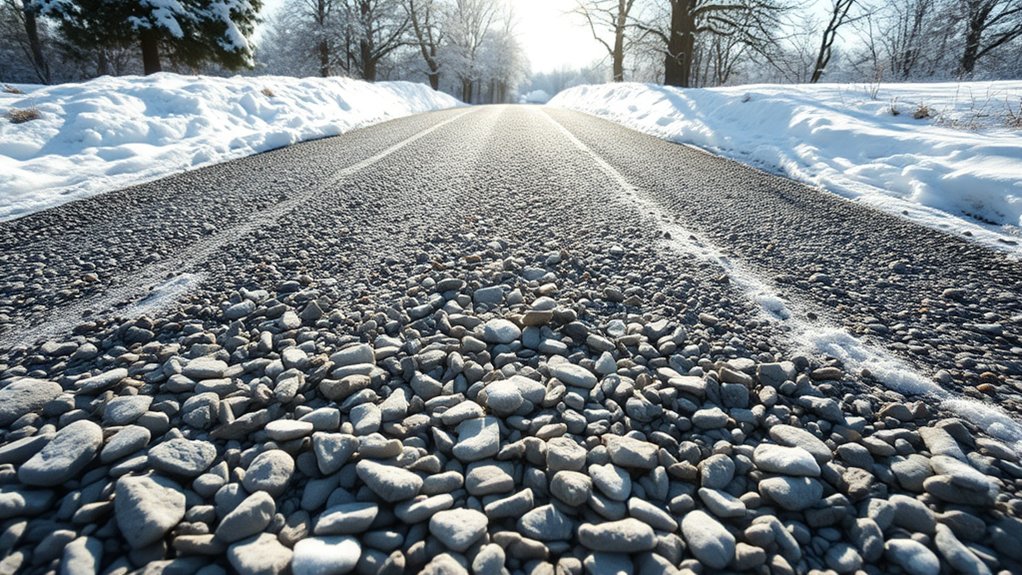
Gravel driveways are a practical and cost-effective option, especially in colder climates. They typically have a lower initial cost per square metre compared to asphalt or concrete. The installation process is straightforward, requiring less labour and equipment, which helps keep expenses down.
One of the main advantages of gravel is its porous surface, which allows rainwater to drain naturally, reducing the risk of ice formation in winter and improving safety. This drainage also supports soil health and helps prevent erosion, which is particularly important in colder regions.
Maintenance is straightforward, involving simple tasks like regular grading and topping up the gravel as needed. This makes gravel driveways a durable and resilient choice, capable of withstanding the challenges posed by freeze-thaw cycles while offering a variety of design options.
Resin-Bound and Resin-Bonded Driveways: A Modern Solution
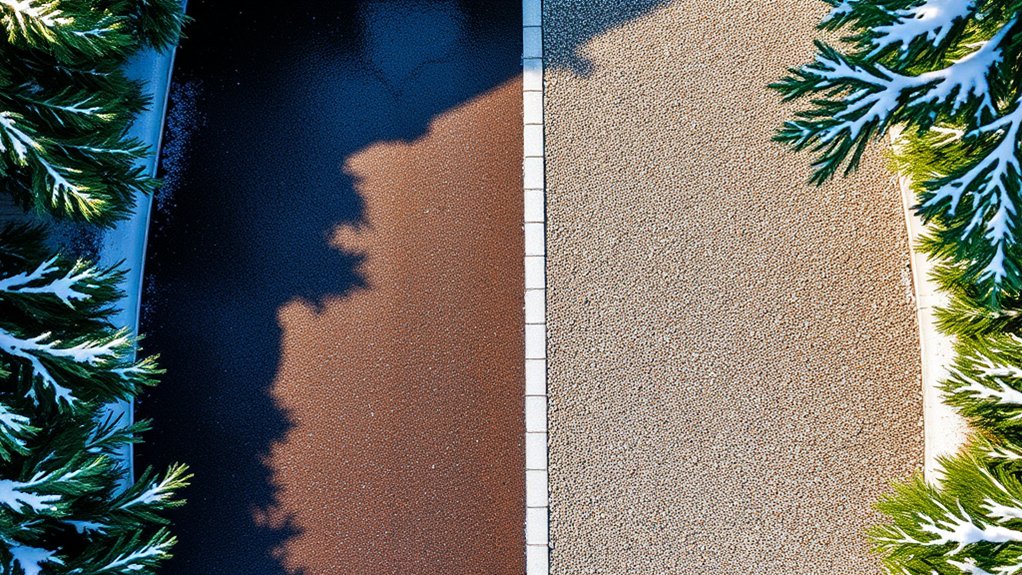
When choosing a driveway for colder climates, resin-bound surfaces provide notable benefits in terms of durability and safety.
Their porous design allows for effective drainage, reducing the likelihood of ice forming and making them usable all year round.
However, it’s crucial to ensure proper installation and maintenance to get the best performance and longevity, especially in tough weather conditions.
Benefits of Resin-Bound
Resin-bound driveways offer several benefits, particularly in colder climates where traditional materials can struggle.
Here’s why they stand out:
- Durability: Resin-bound surfaces are tough and can handle extreme cold, frost, and ice without cracking.
- Water Drainage: Their porous nature allows for efficient water drainage, preventing puddles and minimising the risk of ice formation.
- Safety Features: The anti-slip properties provide added safety for pedestrians and vehicles, even in icy conditions.
- Aesthetic Appeal: With a range of colours and textures available, resin-bound driveways can significantly enhance the look of your property.
Installation and Maintenance Tips
To ensure a successful installation of resin-bound and resin-bonded driveways in cold climates, there are a few essential factors to consider.
Firstly, make sure the temperature is above 5°C during installation; otherwise, the curing and bonding process may not work properly.
Use installation techniques that avoid wet or extremely cold conditions, and think about using ground heating to keep temperatures stable.
It’s advisable to choose high-quality, freeze-resistant materials and winter-grade resin for added durability.
For maintenance, remove snow using gentle scrapers instead of salt to avoid damage.
Regularly check for ice and ensure proper drainage to prevent issues.
Be proactive in spotting cracks or displacement of aggregates; addressing minor problems quickly can help maintain the integrity of your driveway.
Environmental Considerations: Sustainability in Driveway Choices
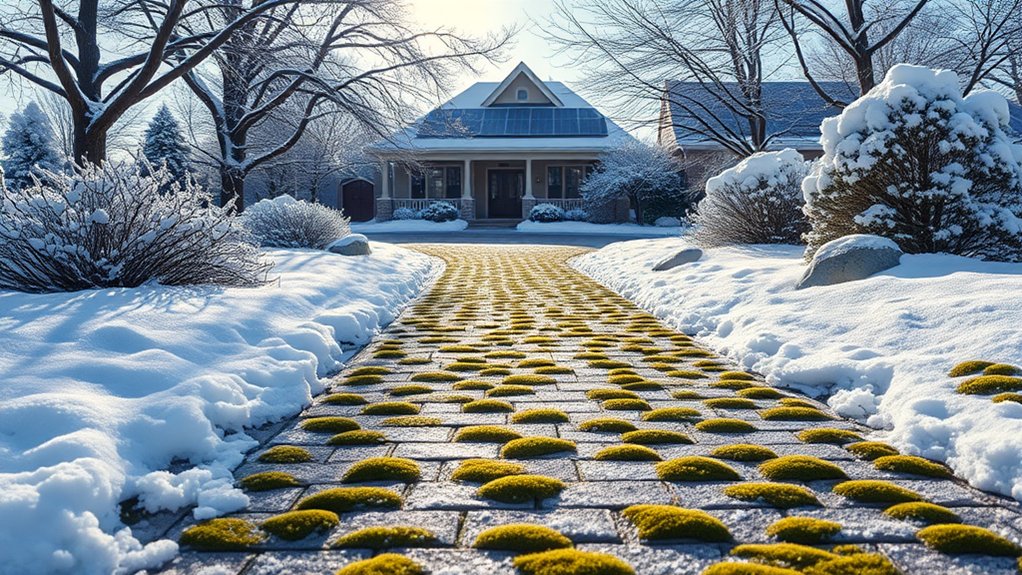
As homeowners in the UK become more environmentally conscious, selecting the right driveway material is crucial for minimising environmental impact.
Opting for sustainable materials not only benefits your property but also supports the ecosystem. Here are some eco-friendly options to consider:
- Permeable Pavers: Made from 100% recycled plastic, these pavers allow rainwater to drain naturally, improving groundwater quality.
- Interlocking Concrete Pavers: Their ability to withstand freeze-thaw cycles reduces cracking, prolonging their lifespan and minimising waste.
- Grass Pavers: These driveways allow for stormwater absorption and promote greenery, blending seamlessly with your garden.
- Recycled Materials: Incorporating products like glass or rubber pavers diverts waste from landfills while offering a distinctive look.
Maintenance Requirements: Ensuring Longevity in Cold Climates
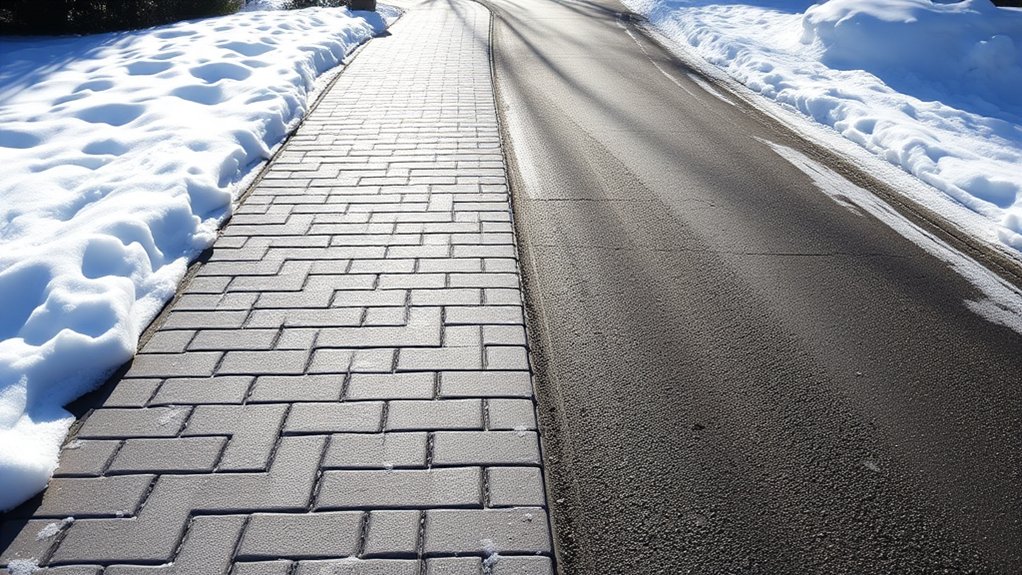
Cold climates can pose specific challenges for driveway maintenance, but knowing how to care for your chosen surface can greatly extend its life.
Start by regularly clearing leaves and debris to avoid moisture traps that lead to ice and cracking. Pressure wash your driveway before winter to ensure a clean surface, making it easier to spot any cracks that need fixing.
Keep drainage systems clear to prevent water pooling, which can worsen freeze-thaw damage. Address any cracks promptly with quality sealants, as small issues can quickly worsen in cold weather.
When it comes to snow removal, use appropriate techniques and minimise salt to reduce corrosion risks. Following these maintenance tips will help keep your driveway in good condition throughout the winter months.
Frequently Asked Questions
How Do Temperature Fluctuations Affect Driveway Material Performance?
Temperature fluctuations significantly impact the durability of driveway materials. Asphalt is more flexible, allowing it to adapt to these changes without damage, whereas concrete is rigid and can suffer from cracking when subjected to temperature shifts. For instance, in the UK, the freezing and thawing cycles in winter can cause concrete driveways to develop cracks, while asphalt remains intact. Considering these factors is crucial when selecting the right driveway material for your home.
What Is the Lifespan of Each Driveway Material in Cold Climates?
The lifespan of your driveway can vary significantly based on the material used. Asphalt typically lasts between 12 to 30 years, while concrete can endure for 20 to 50 years, depending on how well it’s installed and maintained. For instance, a well-maintained concrete driveway in a cold climate can outlast a poorly maintained asphalt one.
Are There Specific Installation Techniques for Winter Conditions?
For effective installation during winter, ensure proper base preparation and drainage systems are in place. Use control joints to manage cracking, and consider adding thermal insulation to improve heating efficiency in your driveway project.
How Do Driveway Materials Impact Property Value?
Driveway materials can significantly affect property value, primarily through their visual appeal. A well-maintained driveway, made from quality materials like block paving or resin, enhances curb appeal. This suggests to potential buyers that the property has been cared for, increasing its perceived value and making it more attractive. For instance, a cracked and worn tarmac driveway may deter buyers, while a neat, gravel driveway could create a welcoming impression, potentially speeding up the sale.
Can I Use Heated Driveways in Cold Climates?
Yes, heated driveways can be used in cold climates. They effectively manage snow removal, ensuring safety and minimising maintenance. This technology not only adds convenience but can also enhance your property’s value through increased functionality and appeal. For instance, imagine never having to shovel snow again – a real time-saver during harsh winters.
Conclusion
In cold climates, you might assume the toughest materials would be the best, but it’s often the flexibility of asphalt that stands out. While concrete is durable, it can crack under pressure from freezing and thawing. Gravel may be budget-friendly, but it comes with its own maintenance issues. Pavers and resin options are stylish, yet they require careful thought regarding installation and upkeep. Ultimately, selecting the right driveway material hinges on functionality rather than trends—who knew practicality could look good too?
Beneath the surface of tarmac and asphalt driveways lies a world of differences; discover which option suits your needs best.
Choosing between a tarmac and resin driveway can be challenging; discover the key factors that could influence your decision.
Tarmac driveways can support impressive weights, but understanding the key factors will help you determine just how much yours can Read more

